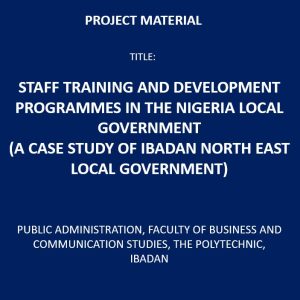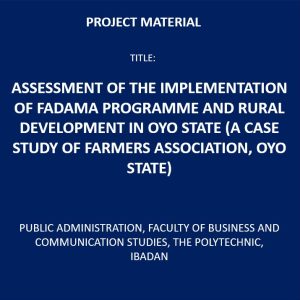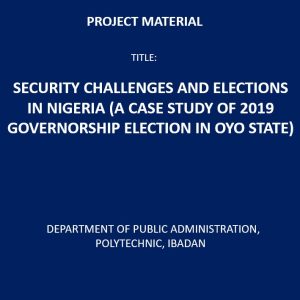No products in the cart.
Inter-Governmental Relation and its Impact on Local Government Administration in Nigeria
₦10,150.00
INTER-GOVERNMENTAL RELATION AND ITS IMPACT ON LOCAL GOVERNMENT ADMINISTRATION IN NIGERIA
- CASE STUDY: ATIBA LOCAL GOVERNMENT OF OYO STATE
- NUMBER OF PAGES: 57
- FILE TYPE: DOC - CHAPTER 1-5
- DEGREE: HND
- DEPARTMENT: PUBLIC ADMINISTRATION, FACULTY OF BUSINESS AND COMMUNICATION STUDIES, THE POLYTECHNIC, IBADAN
INTRODUCTION
An intergovernmental relation assumes that in any modern society governmental systems are broken down into tiers, political or constituent units. This is why intergovernmental relation is commonly associated with federalism. Federalism represents a principle for the organization of decision making in an association of groups of people within a nation‐state. The peculiarity of this association is that such groups are endowed with a special function in central decision making. Furthermore, the groups possess a relative autonomy that is constitutionally recognized.
Therefore, a federal system of government recognizes and respects the co‐existence of concurrent governments with well‐defined autonomy. Thus, the central government does not play any dominating role in its relationship with the other units of government. Federalism, therefore, emphasizes the sharing of power in political systems with each level of government exercising its powers within constitutionally approved limits. (Frankel: 1999).
Intergovernmental relations lay emphasis on interactions among human beings “clothed with office, however, while human beings are responsible to carry out the relations between governments, finance is the most critical element of these interactions. The central government plays vital role in creating institutions for intergovernmental relationship and in articulating intergovernmental cooperation. The intervention by the central government is either direct or indirect and the effect of central government interference in the organization of intergovernmental interactions is felt by the three tiers of government. (Ayo and Olo 2005)
The structure and composition of societies define their governance and administration. Multi-national states are mainly formed on the bases of heterogeneity in culture, descent and origin as seen in India, America, Canada, and even Nigeria. Thus, the Nigerian government and administration is structured in a manner that the various ethnic groupings and nationalities would be represented in processes of policy formulation and execution. The evolution of federalism in Nigeria derives from economic, political/constitutional, social and cultural developments which have influenced the nature and character of inter-governmental [power] relations (Ekpo, 2004).
Fiscal and power arrangements are usually properly worked out among the various levels of government which invariably establishes the power configuration in federal states with the exclusive, concurrent and residual legislative lists clinically enumerated and delineated. The three tiers of government: the national (federal), state and local levels of government all have defined power allotments with the national government wielding overriding status and functions.
The advent of civilian rule and democracy in Nigeria in 1999 has occasioned recurrent issues/problems of inter governmental socio-political and economic wrangling and crises amongst the different levels of government. The issues of revenue allocation/sharing formulae, resources control; internal security and terrorism; creation of states; wage fixing; establishment of the sovereign wealth fund; structure, composition and funding of local government councils among others have generated intense debates that have at various times touched negatively on the foundations of the federation.
Unfortunately, the operation of intergovernmental relation in Nigeria put the local government, though being recognized by the constitution as the third tier of government, in a servant position to the higher level of governments within the federal system. It is based on this note that this research study will examine the impact of intergovernmental relations on local government administration in Nigeria with a particular reference to Atiba local government
- ₦10,150.00






